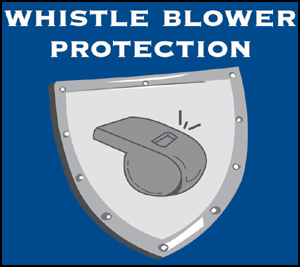 |
In many states employees not working under an employment contract can usually be terminated for any reason or no reason at all as long as the reason is not illegal. But what about public employees who work for a state, county, or local government? In Idaho, those employees fall under the Idaho Protection of Public Employees Act. |
Laws like this are commonly referred to as “Whistle Blower Protection Laws.” The laws are intended to encourage public employees to make good-faith reports of fraud, waste, or abuse. The laws prohibit adverse actions being taken against an employee for making such a good-faith report. As provided in Idaho Code 6-2103:
“Adverse action” means to discharge, threaten or otherwise discriminate against an employee in any manner that affects the employee’s employment, including compensation, terms, conditions, location, rights, immunities, promotions or privileges.
The laws do not protect employees who file knowingly false and malicious complaints against an employer.
Idaho Code 6-2109 requires the employer to “…use appropriate means to notify its employees of their protection and obligation under this chapter.” (Memo to the City of Coeur d’Alene: Morse code, semaphore flag signalling, and Navajo code talkers are not considered “appropriate means.”)

I’m sure the crowd at 710 Mullan is as good at informing their employees of this code as they are of informing elected officials of the Idaho Open Meeting Law.
Comment by Dan — October 19, 2008 @ 11:12 am
Whistleblowers almost always get punished, laws or no.
Comment by Pariah — October 19, 2008 @ 11:31 am
Anyone that does not support the administration goals (legal or not)gets the axe sooner or later. Ask any ex-employee.
Comment by LTR — October 19, 2008 @ 4:43 pm
lots of x employees and still afraid. ask steve badraun why.
Comment by TheWiz — October 19, 2008 @ 5:27 pm
Thanks for the comments.
Pariah, yes, whistle blowers do get sometimes get punished. Reporting a fellow employee’s unlawful or negligent behavior is not easy. It’s usually a very agonizing decision, not because the whistleblower is weak or cowardly but because s/he’s very concerned that (1) s/he may be wrong, may not have all relevant facts, and (2) innocent people, maybe honest fellow workers, will be harmed. The decision to report wrongdoing is often made after the whistle blower has tried unsuccessfully (and sometimes after being punished as you said) to use internal remedies, to solve the problem “in house.” Ultimately, public employee whistle blowers often decide their first obligation is to prevent further harm to the public in whose names they conduct business. That’s what gives them the moral courage to come forward.
It is one thing to not be a team player, quite another to be a co-conspirator. An honest and ethical employee who cannot support the administration’s lawful goals ought to resign if s/he is unable to perform his duties and if s/he is unable to reconcile differences with his employer. That same employee who is asked or ordered to violate the law should first object, then blow the whistle when it becomes apparant the violator intends to continue to violate the law.
For example, suppose I was a state employee who had been ordered to suppress an investigation I was obligated to perform. Suppose further I was ordered to destroy evidence relevant to the violation. And finally, suppose one of the people who ordered me to do both was an elected state official. What should I do? Knowing the political nature of our state police and knowing that the state police would inform the elected official if I complained to them, I could either keep quiet or go to the feds. I might not think it through and would elect to keep quiet, reasoning that by keeping quiet, I represent no threat to the perpetrators. There’s a flaw in my illogic: The official and the developers who threatened me still don’t trust me. They never will. As long as my information is credible, I represent a threat to the official and the developers. I reasoned that by keeping quiet, my retirement security would be assured. Just the opposite is true. As I approach retirement, I will be fired or demoted. (That’s a “message” adverse action.) If I then try to raise the stale violations, my complaint will be dismissed as “sour grapes” at being fired or demoted. And by that time, any physical evidence (e.g., appointement books, telephone logs, emails, etc.) that would have substantiated my original complaint will have either been destroyed or doctored.
Comment by Bill — October 19, 2008 @ 6:59 pm
Bill, interesting article in today’s CDA Press about a whistle blower locally who won a 9th distirct Court of Appeals on his First Amendment protection. Who is his attorney , I’m wondering.
Comment by Gary Ingram — October 20, 2008 @ 10:18 am
Gary,
I only read the Press at the Hayden library and didn’t read yesterday’s yet.
You may be talking about Robert B. Posey v Lake Pend Oreille School District No. 84; Board of Trustees, Lake Pend Oreille School District No. 84; Jim Soper, Building Principal in his individual and official capacities.
Posey was represented by the firm of Bredhoff & Kaiser, PLLC, from Washington, DC., and specifically by John West. That firm’s federal practice is heavily weighted toward labor and employment law.
Note that CA9 only reversed the lower court’s summary judgment and remanded to the District Court for rehearing.
Comment by Bill — October 21, 2008 @ 7:18 am